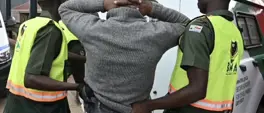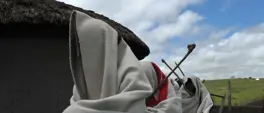MALAIKA MAHLATSI: Chidimma Adetshina is a victim of systematic corruption at Home Affairs
Malaika Mahlatsi
12 August 2024 | 5:19It is important to remember that in this emotionally charged state that so many South Africans are in, that Chidimma Adetshina is also a victim of fraud, a situation not at all uncommon, writes Malaika Mahlatsi.
Over the last two weeks, South Africans have been captivated by the story of Miss South Africa contestant, Chidimma Adetshina, after she was attacked on social media for her Nigerian heritage.
At the forefront of this controversy has been Minister of Sport, Arts and Culture, Gayton McKenzie, who has been making charged statements about how Adetshina, who was born to a mother with Mozambican roots, should not be participating in the pageant - which, by law, is open only to South African citizens.
McKenzie went on to request that the Department of Home Affairs investigate Adetshina’s status in the country to confirm her citizenship, leading to the organisers of Miss South Africa to also send a request for the department to verify the citizenship of the contestant.
On Wednesday, the 7th of August 2024, the Department of Home Affairs released a statement on the ongoing investigation, stating it had found a prima facie case of identity fraud by the mother of Adetshina.
According to the statement: “An innocent South African mother, whose identity may have been stolen as part of the alleged fraud committed by Adetshina’s mother, suffered as a result because she could not register her child”.
This is a heartbreaking reality about identity fraud – that the victim, rather than the perpetrator, pays a price for the crime.
But it is important to remember in this emotionally charged state that so many South Africans are in that Chidimma Adetshina is also a victim of this crime.
The statement of the Department of Home Affairs makes this clear by saying: “Adetshina could not have participated in the alleged unlawful actions of her mother as she was an infant at the time when the activities took place in 2001”.
The prima facie evidence pertains to her mother, an adult who allegedly knowingly stole the identity of a South African woman. This situation is not at all uncommon.
There are thousands of cases of identity fraud in South Africa, where foreign nationals of all races collude with officials in the Department of Home Affairs to acquire South African citizenship. In an exclusive interview with The Witness just over two months ago, then-Home Affairs minister, Dr Aaron Motsoaledi, admitted that there is a syndicate in the department that has been selling identity documents to foreign nationals.
The minister stated that between 2018 and 2024, roughly 182 department officials were dismissed for fraud and corruption in relation to this crime.
The rot in the department goes to senior management. According to Motsoaledi, among those dismissed was a chief director who was implicated in assisting a foreign national in getting a permanent residence permit in the country at an undisclosed fee.
The horror in the methods that are employed by Home Affairs officials in this identity theft syndicate is that those who are targeted for the theft of identity are usually vulnerable individuals.
One of these methods was described by Motsoaledi in The Witness exclusive interview, stating: "If they have 10 foreigners, these crooked officials will round up 10 SA nyaope (drug) addicts and go to a Home Affairs office at night, depending on the area they are based in, and process the documents. Every detail of the addict will be accessed and when it comes to the photo, the foreign national will be the one who poses for the photo and in that manner, the South African citizen has lost his identity to the foreigner."
Drug addicts, vulnerable individuals battling a debilitating condition and often isolated from social and economic activities, often do not realise that their personal details have been fraudulently used to sell citizenship to foreign nationals.
Because they are often not in education, employment, or training, and they do not have access to credit, drug users often do not know that their identities are being used elsewhere. It usually comes out in circumstances where their family members must access funeral policies, or where their own children have to obtain an identity document – usually when they (the children) are about to sit for their matric examinations.
By that time, the crime is so entrenched that it takes years for any resolution to happen – if ever. And this is the real tragedy with identity theft – its victims extend beyond the initial victim whose identity is stolen, to the offspring of that person.
It is a calamitous ripple effect. Chidimma Adetshina, an innocent child whose mother likely committed a crime, is now paying the price, exactly as the child of the woman whose identity Adetshina’s mother fraudulently acquired.
In all the noise that is happening, it is important that we remember Adetshina was only an infant when her mother allegedly stole someone’s identity. She had no part in it and grew up in a South Africa that she had always known to be her home. She had no reason to doubt the validity of her citizenship because even if her mother, or both parents, were not born in the country, she could still legally be a naturalised citizen.
Adetshina’s mother has lived in South Africa for decades, and so, per the Citizenship Act, she could have been naturalised. Citizenship by naturalisation is possible for a person in possession of permanent residence who has ordinarily resided in South Africa for at least five years after acquiring permanent residence status, and who has not been absent from South Africa for more than 90 days per year in any of the five years preceding the submission of his or her application for citizenship.
More than this, we must look closely at the bigger story – that the theft of identities of South Africans is made possible by the actions of officials in the Department of Home Affairs. Adetshina’s mother could have never committed the fraud successfully without the wilful actions of these officials.
It is they who provide identities to steal, they who sell these identities, and they who process the documentation in the system. Foreign nationals who acquire fraudulent identities and passports are not innocent of their role in the crime, but their crime is made possible by our own officials.
Without these officials, it would not be possible for the crime to occur. If we are serious about dealing with the crime, we must deal with the syndicates within the Department of Home Affairs - the South African men and women who enable and facilitate the theft and sale of identities for foreign nationals who, desperate for a better life in our country, are simply taking advantage of a rotten system.
It is high time that a commission of inquiry into the systematic corruption and rot in the Department of Home Affairs is conducted – one that will lead to the prosecution of all those who are responsible for the destruction of so many lives.
This must happen in conjunction with the speedy digital modernisation of applications and the strengthening of the capacity to handle the pending applications and massive backlog.
The latter is especially important because there is a significant number of foreign nationals who enter South Africa legally, and do everything possible to regularise their stay in the country, but are frustrated by the slow and ineffective systems of Home Affairs, ultimately resulting in the expiration of their legal documents, thus rendering them undocumented.
My sincere hope is that in the resolution of the Adetshina case, the outcome does not further imperil the victims – the mother whose identity was stolen, the child who could not be registered as a result, and a young woman who was born in this country and unknowingly benefited from a crime that she did not and could not have participated in, per the admission of the Department of Home Affairs.
That her mother committed a crime should not imperil the status of a young woman who was born in this country, identifies with its values, and knows no other home.
It would be a grave injustice if Chidimma Adetshina is to be punished while the real criminals in our government, the officials at Home Affairs, continue to be in employment, where they are paid with our tax money.
Malaika is a geographer and researcher at the Institute for Pan African Thought and Conversation. She is a PhD in Geography candidate at the University of Bayreuth, Germany.
Get the whole picture 💡
Take a look at the topic timeline for all related articles.
















